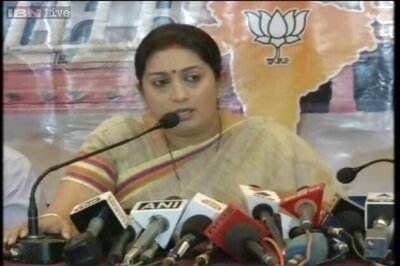
views
It may be a moment of magizhchi (happiness), as her lawyer put it, for Nalini Sriharan and five others to be finally free after 31 years in jail for the assassination of former prime minister Rajiv Gandhi, but for retired police officer Anusuya Daisy Ernest, the Supreme Court’s decision is a “black day”.
Ernest was the police sub-inspector, who seconds before Rajiv Gandhi was killed, had attempted to block the LTTE’s “human bomb” Dhanu from approaching him once but could not do so the second time. ‘Just relax. Don’t worry’, were Gandhi’s last words to her before Dhanu bent to touch Gandhi’s feet and detonated the bomb-laden vest that killed him and 15 others on May 21, 1991, in Tamil Nadu’s Sriperumbudur.
With the top court’s decision to free the convicts, the now-retired officer said she felt like the deaths in the blast were in vain. “It was an act of terrorism and they were sentenced to life imprisonment and should have been there till the end of their lives. They should have spent their lives in prison and not released like this. Was the sacrifice of Rajiv Gandhi, others killed in the blast or the trauma endured by the injured like me, in vain? I am having to suffer a lifetime of disabilities because of the terrorist acts of these convicts. What about family members of the police officials who died? Where is the justice in this? “ she asked.
Like his mother Indira Gandhi before him, 47-year-old Rajiv Gandhi was the second Indian PM to be assassinated. He was killed by the Liberation Tigers of Tamil Eelam (LTTE), a now-defunct armed militant group in Sri Lanka waging war against the island nation’s government back then.
‘Shouted that I was alive and should be saved’
Ernest had joined as a constable in 1981 and was holding the rank of a sub-inspector when the Sriperumbudur blast took place. She later retired as additional superintendent of police from Villupuram district in May 2018. The last few moments with the former PM are fresh in her mind.
“The venue was cordoned off properly and people, who had come in huge numbers, were made to stand in an orderly manner. The moment Rajiv Gandhi arrived, people rushed forward to greet him. A young girl called Kokila read out a poem despite the din. Then, two women came to him with shawls. I tried pushing them away as they were too close,” Ernest told News18.
“It was then that Rajiv Gandhi tapped my shoulder and told me to relax. I smiled at him but had to get right back to controlling the crowd. That’s when the blast took place and it was all a big haze. I could see fire all over and there was a loud ringing in my ears. I thought I was going to die and this is how death looked,” she said.

Serving as a sub-inspector at the time, Ernest said she was lucky to have come out alive as she was accidentally pushed away by the crowd that began to gather around Gandhi. Her left side was badly affected and she could not move, feeling like her whole body was on fire.
“It was as if my body had melted; I was screaming for help. I shouted that I was alive and should be saved. I kept praying and tried to move, but the heat of the blast had charred off my clothes and my skin was severely burnt. Seeing I was alive, sub-inspector Raghavendra came rushing to lift me but my back and lower torso were badly burnt,” she said.
The woman officer spoke about how she struggled for life at the Sriperumbudur government hospital, where she was bedridden for three months. The doctors struggled to take the pellets from the blast out of her body. Ernest lost two on her left hand, which had to be amputated while a third was fixed using plastic surgery.
Gandhi siblings forgave Nalini, five others ‘completely’
Nalini, who was released on Friday, said she was “not a terrorist” and had suffered and struggled in jail over the past 31 years. Ernest disagreed and said the same SC that had ordered their release had taken the investigation of the case into consideration before holding them guilty and convicting them.
The officer said she felt let down as not only was their death sentence commuted to a life sentence, but now the accused were also getting the opportunity to “walk free” despite an “inhuman terrorist act”. The convicts were freed for their “satisfactory behaviour” during their prison sentence.
In 2018, the Tamil Nadu cabinet had also recommended to the governor to set the convicts free, making way for this final decision by the apex court. The six convicts who were freed are Nalini Sriharan, P Ravichandran, Jayakumar, Suthenthiraraja @ Santhan, Murugan and Robert Payas. The seventh convict, AG Perarivalan, was set free in May after the SC used its extraordinary powers to grant him an early release.
The news of Gandhi’s assassination in Sriperumbudur in May 1991 had sent shockwaves across the country and, since then, has stirred up deep emotions in Tamil Nadu — either of hate or of the need to pardon. The major political parties in the state, AIADMK and DMK, have actively campaigned for the early release of the convicts arguing that they were minor players who were duped and later double-crossed by the real perpetrators.
The convicts pushed for their release even more aggressively after Rajiv Gandhi’s children and Congress leaders, Priyanka Gandhi Vadra and Rahul Gandhi, said they had come to terms with their father’s death and had “completely forgiven his killers”.
“It is true that I met Nalini Sriharan in Vellore jail on March 19, 2008. It was my way of coming to peace with the violence and loss that I have experienced,” said Priyanka Gandhi, when asked why she wanted to meet her father’s killers. Ten years later Rahul, too, concurred with his sister saying they had “completely forgiven” their father’s assassins and had no objection to them being released.
In 1998, after thorough investigations, 26 were named accused in the case and sentenced to death by a Chennai Terrorist and Disruptive Activities (Prevention) Act court. However, in 1999, the SC acquitted 19 of the convicts and commuted the death sentences of three accused — Jayakumar, Payas and Ravichandran — to life imprisonment.
The SC, however, upheld the death sentences of Nalini, Murugan, Santhan and Perarivalan. But due to the intervention of Rajiv Gandhi’s wife and former Congress president Sonia Gandhi, Nalini’s sentence was reduced to a life term. The death sentence of the others were also commuted to a life term and, in the same year, despite strong objections from the Congress, then Tamil Nadu chief minister J Jayalalitha initiated discussions to free the assassins. The DMK also pushed for their early release.
Read all the Latest India News here




















Comments
0 comment